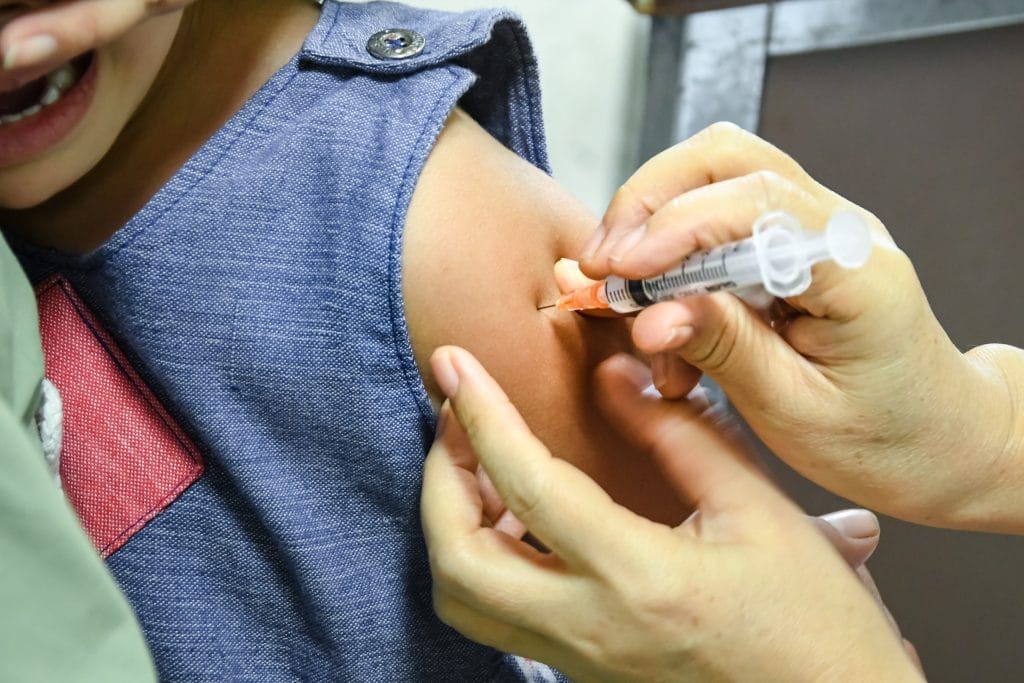
A measles outbreak in Mumbai, followed by Ranchi, Ahmedabad and Malappuram in India over the past month has drawn attention to the large number of unvaccinated children. Over 16,000 suspected cases have been recorded in India. Of the 20 children who have died of measles since October 26 in the Mumbai Metropolitan Region, just one had been vaccinated – but only with the first of the two-dose course. https://scroll.in/article/1038541/?utm_source=substack&utm_medium=email
As health workers launch an intensive door-to-door campaign to persuade parents to have their children immunised, public health experts point to the threat from another infectious disease for which a vaccine exists but is still not part of India’s free universal immunisation programme.
Typhoid – a water-borne disease that spreads through water and food contaminated with Salmonella Typhi bacteria – kills an estimated 1,28,000-1,61,000 people a year. India accounts for over 40% of these deaths while more than eight million Indians get the disease every year. The bacterial infection causes high fever, weakness, stomach pain and diarrhoea. In severe cases, it can lead to pneumonia or intestinal bleeding and cause death.
In June, an expert sub-committee, under the chairmanship of virologist Dr Gagandeep Kang, recommended that the typhoid vaccine be included in the country’s universal immunisation programme during a meeting of the National Technical Advisory Group on Immunisation (NTAGI) which advises the government on vaccine-related policy decisions. If not, the committee warned that typhoid could result in 89,300 deaths and cause 46 million cases in the next 10 years, the minutes from the meeting held on June 28 show.
A typhoid vaccine can currently be purchased and administered at private healthcare facilities in India. But Dr Jayprakash Muliyil, professor at Christian Medical College, Vellore, said cost remains a prohibitive factor with a single dose priced between Rs 2,000-Rs 2,500. “It is expensive and used by only those who can afford it,” he said. Muliyil is also member of the expert sub-committee in NTAGI.
The high cost has led to poor uptake of vaccine. In 2016, NTAGI recommended the formation of the Surveillance for Enteric Fever in India consortium to assess the typhoid burden across India before it could take a call on rolling out the vaccine. Kang and Muliyil were part of it. Kang said their survey at various sites suggested that only 9%-10% of eligible children could pay to get a typhoid shot.
“We have already made a recommendation to include typhoid in routine immunisation,” Kang said. “It is up to the government how and when they implement it.”
If the vaccine is included under the universal immunisation programme and procured in bulk by the government, the cost of a dose could drop to Rs 160-Rs 200, say experts, and it would be available free of cost for the less better off.
Kang said once NTAGI makes a recommendation, the government takes a call on whether and when to launch a vaccine. Sometimes it gets done within weeks and sometimes it can even take years. In 2014, the rotavirus vaccine was recommended by NTAGI, it was introduced in the universal immunisation programme two years later in 2016. In 2017, NTAGI recommended the human papillomavirus vaccine – which helps prevent cervical cancer – but the vaccine is yet to be rolled out in the immunisation programme.
Most recently, in January 2021, vaccines against Covid-19 were rolled out within days of the NTAGI’s recommendation.
The continued delay in rolling-out the typhoid vaccine in India will not only cause more fatalities, but also increase drug resistance and health expenditure in a country with a large, vulnerable population. Poor families are the most susceptible to typhoid, which spreads through the oral-faecal route in places with poor sanitation and hygiene. It is already endemic in sub-Saharan Africa and South Asia, and cases of drug resistance are fast spreading in India’s neighbouring country Pakistan.

